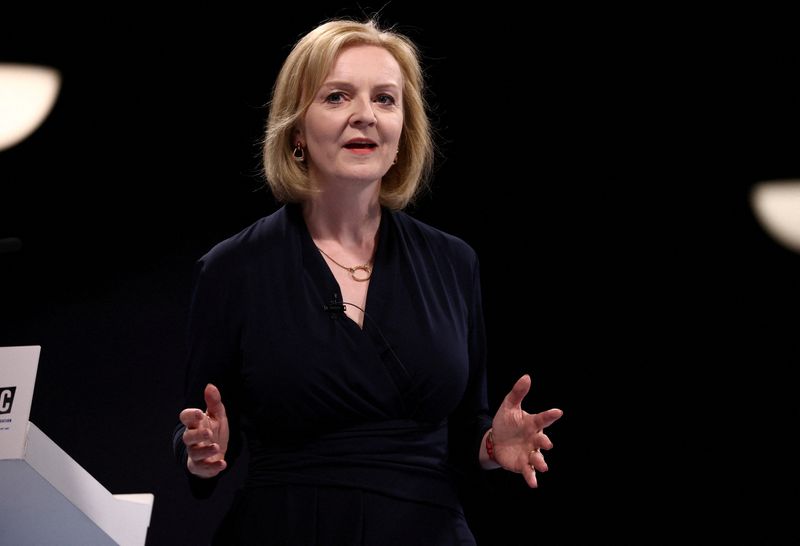
© Reuters
By Geoffrey Smith
Investing.com — The pound gained on Tuesday after an initial uptick on reports that incoming Prime Minister is preparing a package of measures that could be worth as much as 170 billion pounds ($196 billion) to ease the pain of the ongoing energy crisis.
Bloomberg reported on Tuesday that Truss is eyeing up to 40 billion pounds of support for businesses to get through the coming winter, while a report on Wednesday estimated that relief measures for households could run to as much as 130 billion.
Bloomberg reported on Monday that Truss intends to scrap the pricing formula proposed by regulator Ofgem, under which household bills are set to rise by around 80% from October. Instead, the government itself will set a reference price, it added. A similar plan under which the responsibility for price-setting would also rest with the government is to be presented to businesses within a month, Bloomberg reported on Friday.
While such figures would put a substantial safety net under the economy in the near term, equivalent to nearly 5% of gross domestic product, Truss has offered little information on how they would be financed. On the contrary, she has ruled out imposing a windfall tax on energy companies to raise the funds.
Various reports suggested that the plan would feature large-scale government-guaranteed loans to energy suppliers to help them cover the cost of buying energy at today’s inflated levels to sell at a loss to their final customers. The money would then be recouped by a levy on future bills. The details haven’t yet been confirmed publicly by Truss or anyone in her team.
Saxo Bank analysts said the plans appeared to be “a recipe for ballooning fiscal deficits, an issue that is already an ingredient in sterling’s steep fall this year.”
By 05:30 ET (09:30 GMT), the pound was up 0.6% against the dollar at $1.1580, and up 0.5% against the euro at 1.1647, extending gains made on Monday as her confirmation as Conservative Party leader ended a period of policy drift under lame duck Prime Minister Boris Johnson, who had announced his intention to step down in July under pressure from a series of ethics-related scandals.
Wholesale energy prices spiked at the start of the week but have retreated in the last 24 hours amid reports that the (much larger) European Union will adopt measures to cap wholesale prices and reduce energy consumption at a meeting of energy ministers on Friday.
By 06:00 ET, benchmark European natural gas futures were down another 11.3% from Monday’s close at 218.25 euros a megawatt-hour. That’s a drop of 23% from the high posted in reaction to Russia’s closure of the Nord Stream 1 pipeline late on Friday.
The price reaction suggests that Russia’s economic leverage over Europe may be weakening, said Exante Data CEO Jens Nordvig via Twitter.
“Russia went ‘nuclear’ in relation to its economic war with Europe on Friday, by permanently shutting down Nord Stream flow,” Nordvig said. “But NatGas prices only bounced for a day and are now back to the level seen before the Russian shut-down.”
Source: Investing.com




























